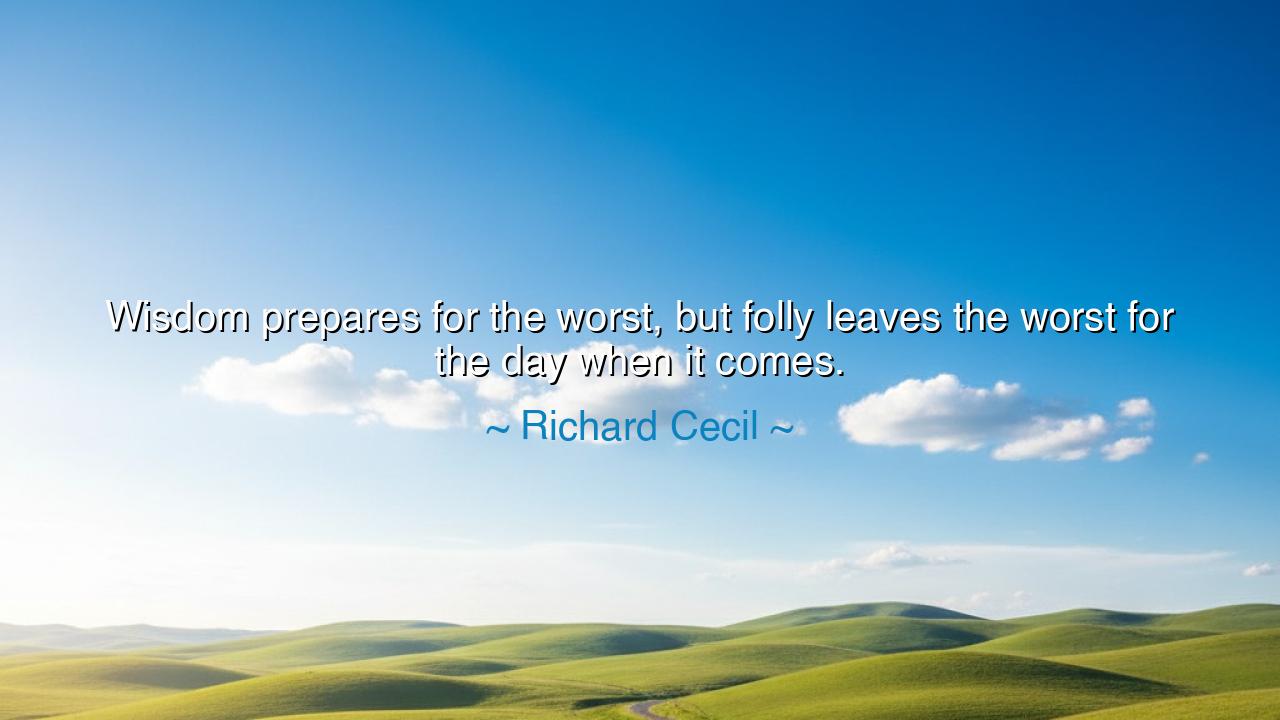
Wisdom prepares for the worst, but folly leaves the worst for






Hearken, children of the ages, to the prudent words of Richard Cecil, who proclaimed: “Wisdom prepares for the worst, but folly leaves the worst for the day when it comes.” In these words lies the eternal truth of foresight, prudence, and the perils of negligence. The wise anticipate the trials and hardships that life may bring, girding themselves with knowledge, preparation, and moral fortitude. The foolish, however, defer reckoning, allowing calamity to strike unchallenged, unmitigated, and unheeded.
Cecil teaches that preparation is the hallmark of wisdom. To foresee danger, to plan for adversity, is not an act of fear but an exercise of reason and foresight. By fortifying one’s mind, resources, and spirit against the inevitable tempests of life, the wise navigate uncertainty with resilience, ensuring that trials, when they arrive, do not overwhelm. In contrast, folly postpones vigilance, leaving the unprepared vulnerable to ruin.
Consider the life of Julius Caesar, who, despite his brilliance in battle and politics, sometimes allowed overconfidence to blind him to imminent peril. The Ides of March revealed the consequences of neglecting caution: enemies struck when vigilance faltered. Here, Cecil’s reflection is manifest: the prudent anticipate and prepare, while folly waits, and the worst arrives unannounced, consuming the unready.
The ancients themselves exalted the virtue of foresight. In Greek and Roman philosophy, prudence—phronesis—was revered as the guiding virtue of life, enabling leaders and citizens alike to act in harmony with reason and to mitigate harm before it arises. Cecil’s observation echoes this wisdom: anticipation and preparation are not mere precaution but the very essence of rational, moral living.
Thus, his counsel is both admonition and guidance: cultivate foresight in thought and action, prepare your mind, your resources, and your spirit for the trials that inevitably come. Let not the weight of adversity fall unchallenged, for the wise are fortified against life’s tempests, while the foolish are left to suffer the consequences of neglect. Wisdom and preparation safeguard the soul and the life it inhabits.
Carry this teaching, children of generations yet unborn: embrace the vigilance of foresight, temper action with prudence, and confront the uncertainties of life with preparation. In this practice lies the enduring power to weather the worst, to preserve hope, and to live with strength, foresight, and enduring wisdom across the ages.






CNLam Chi Nhan
There’s a quiet truth in this idea that really resonates. It reminds me how much of human suffering comes from being unprepared for the inevitable—loss, failure, hardship. But it also makes me wonder: is it possible to truly prepare for life’s worst moments, or do we only imagine that we can? Maybe wisdom isn’t about having a plan for disaster, but about cultivating resilience to face it when it arrives.
GDGold D.dragon
This observation feels timeless. It suggests that foresight is the hallmark of wisdom, while avoidance is the essence of foolishness. I can’t help but think about how often people confuse optimism with recklessness. Does preparing for the worst make someone a realist, or a cynic? Perhaps Cecil’s message isn’t about fear at all, but about humility—the recognition that life’s unpredictability demands both awareness and discipline.
MNMinh Ngoc-9a
I find this quote refreshingly practical. It speaks to the human tendency to ignore problems until they’re unavoidable. In modern terms, it could apply to anything—climate change, financial planning, even personal relationships. It makes me ask: why do we resist preparation when we know better? Maybe it’s not folly but hope that keeps people from acting early. Still, wisdom clearly lies in acknowledging that denial never prevents consequences.
UDUyen Dam
This statement makes me think about the balance between caution and anxiety. Preparing for the worst seems wise, but at what point does preparation become pessimism? I suppose Cecil is warning against complacency, yet I wonder if too much anticipation of disaster can rob us of peace in the present. Is wisdom about readiness alone, or also about maintaining calm and perspective while waiting for what may never happen?